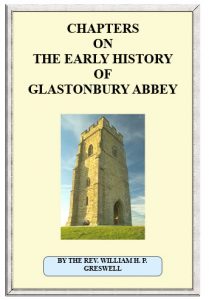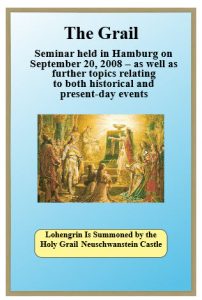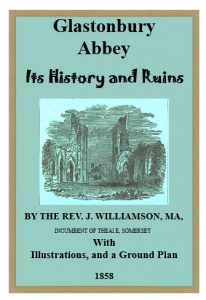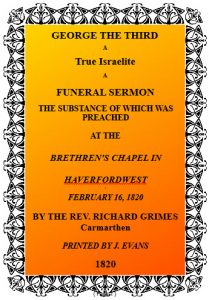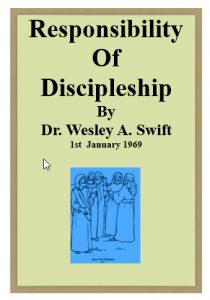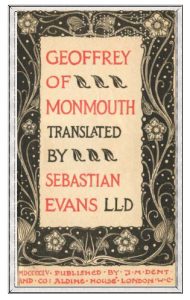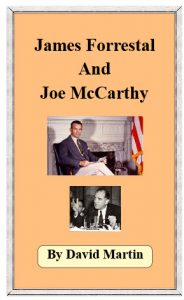IN MAKING A SHORT CONTRIBUTION TO THE EARLY HISTORY OF GLASTONBURY ABBEY I feel that I need offer no apology, as the old Tor itself, although 20 or 25 miles distant as the crow flies, is visible from my windows, and invites the attempt. More often than not it is draped in the mists that sweep up the Severn Sea from the north-west and lies half hid in the mirage of the moorlands. To write about the birth of Glastonbury is to write about a creation that has sprung from the sea, that has grown up silently in the weird marshes and meres of the “sea-moor-saetas,” and that loves to entangle itself in the magic mists of antiquity. Must we always adhere to the litcra scripta in speaking of Glastonbury? It is the land of legend, romantic figures, and shadowy heroes, and there is sometimes more substance to be found in these, especially when place names, topography, dedications, and the consentanea vox of antiquity confirm them, than in the litera scripta of the monastic scriptorium, where the greatest efforts of the Benedictine pens were directed to invent, to simulate, and to forge, so that the detective genius of a Stubbs can hardly winnow the true record from the false. No, we must ransack many storehouses to know and understand this ancient Somerset monastery, not the least or most unimportant of them being those of memories and magic associations that sway men’s feelings and enlist their eternal sympathies. Unlike any other monastery it has handed down from the earliest times the record of a national faith and the lamp of Christian revelation dimmed at times by errors and obscured by the turmoil of national changes, still enduring, with vitality of its own, through British, Saxon, and Norman times. Occasionally we look through a mist and magnify accordingly, idealising what may have been commonplace, but the spirit of the place invites it. And so let it be!
Download Tag: Scripture
The Grail
(Herwig Duschek:) It was then I started to look closely at some of the extremely important statements made by Rudolf Steiner about a century ago. Now – a hundred years on – it is time we really grasped the meaning of these decisive statements without which we would not be able to understand certain aspects of what is happening in the world today.
Rudolf Steiner, 2. 1. 1906 (CW 93): “What is expressed by Tao is a driving force which can only be set in motion by the power of selfless love. It will be possible to use this power to drive machines which will, however, cease to function if egoistical people try to make use of them.
[…] A motive force of a purely moral nature, that is the idea of the future; the most important force with which civilisation must be inoculated, if it is not to fall back on itself. The mechanical and the moral will then have to penetrate each other because, without the moral, the mechanical will be nothing. Today we are standing on this very frontier. (1906! H. D.) In the future, machines will be driven not by steam alone, but also by spiritual-moral power. The Tao sign stands for this power which was poetically symbolised in the past by the image of the Holy Grail.”
Glastonbury Abbey its History and Ruins
THIS SMALL VOLUME is sent forth by its author, with the earnest hope that it may afford some little information concerning a spot most dear to the Antiquarian, and deeply interesting to many whom the facility of modern travelling annually conveys to behold these noble and celebrated Ruins.
Much of its material was originally delivered at Glastonbury in the form of a Lecture. And as some brief and truthful narrative of the Abbey was greatly needed and demanded, it was earnestly requested that it might be published as a sort of Historical Guide.
Yielding to these solicitations, although conscious of many defects, the writer is thereby released from any apology for publishing these memoranda, which might have been considerably extended, if the antiquated documents and charters belonging to Glastonbury Abbey had been incorporated. These curious and ancient records are reserved, together with the writings of John of Glaston, Eyton, and others, for a larger work.
Germans Helped Build America
Twice in this century, within a span of only 24 years, the rulers of America felt called upon to combat an alleged threat to democracy and world peace by waging a “holy war” in Europe, against the will of their people. Twice they repudiated their own founding ideals and drew on their inexhaustible resources to stand by the side of powers who had divided the world amongst themselves in brutal colonial wars – joining forces against a nation that had no possessions beyond its own borders after the First World War, and from which they had only gained benefits in the past.
In costly battles Germans had once contributed to winning young America’s independence from the British Crown. The nation’s subsequent development from primitive beginnings to a position of world leadership in industry and trade is unthinkable without the hard work, efficiency and high moral virtues of the German immigrants.
But the Germans, as numerically the largest ethnic group in the United States, were not only the driving force in America’s material development. Germans set the tone in education and research, and insofar as one can speak of American culture and American intellectual life, it was the enrichment brought by the Germans, with their naturally cheerful way of life and particularly their unparalleled patronage of music, that helped overcome the sterile Puritanism of Anglo-Saxon life, to the benefit of the entire nation.
The following accounts, which are based on the reports of well-known emigrants, shall give an idea of the scope of German achievements in America – and also of the betrayal committed by a power-hungry financial and political clique against the most honest, loyal and decent among their citizens, and against their native land.
George III Funeral Sermon
THE Almighty has, of late, in his visitations, given us such lessons on mortality, as our nation has not, for some considerable time, been accustomed to receive. It is within your recollection, how the whole nation, about two years ago, was appalled by the intelligence, that he, with one stroke, cut off two generations of the Royal Family, You, no doubt, now have some sensations similar to those, which you felt on occasion of the funeral of the late Princess Charlotte.
Little more than a year has elapsed since we assembled to contemplate the decease of the late Queen; when we were instructed, that death spares not even Royalty, whether the time of departure out of this life, be desired or not.
The demise of our beloved King has now called us together; and, while we reflect on his death, and the interment of his esteemed remains, we should not forget, that another branch of his illustrious family, has, since the commencement of this year, been called out of time, after an illness of a very short duration.
Responsibility of Discipleship
AS WE LOOK AT OUR SUBJECT THE RESPONSIBILITY OF DISCIPLESHIP WE TURN TO THE BOOK OF ISAIAH, to the eighth chapter, for it tells us something about disciples and discipleship. Many people confuse the disciple with Sonship. I want to point out to you that disciples are those that follow a leader. A disciple is one who coordinates with HIM, whereas, the family does not always move in the area of discipleship.
Thus, a person may be a son of God, a member of this white race and not be a good disciple. For a disciple is one who follows after the Master, one who coordinates his words. One that agrees with his words, one that advocates his words. And the disciple never disagrees with the Master.
Now, I want to point this out to you however. For the disciple is found in the race of Israel. And then HE speaks and says,’Behold all of the children that God (Spirit) hath given me, all are for signs and wonders in Israel, and they are from YAHWEH. To the law and to the testimony, if they speak not according to this word, it is because there is no light in them, (or they are not my disciples.) Now my disciples are to be found in Israel and they are to proclaim the word and they are to be of Israel.’
Now, there is one factor that is quite significant. For there are some people who think that disciples are just someone who became converts to Christ and became his disciples. But they were of the house of Israel, children raised up to testify as to signs and wonders before all of the nations of the world.
Now, I want to point out to you over here in the book of John, and again we see these words coming forth from the lips of Christ. “If ye continue in My word then art thee my disciple indeed.”
Resisting Unto Blood
OPEN UP TO THE BOOK OF HEBREWS, and in the passage where the Apostle Paul expresses. “Ye have not yet resisted unto blood, striving against sin.” This may seem like a strange and peculiar statement of the Apostle Paul, but he was speaking unto Christians and onto those members of the church. And he was confronted by a operation which was existing in to the church. And I think that it even existed more specially, strenuously, even today. That is the vast numbers within the structure of the church which sought always a easy way out through pacifism and peace. That they never at any time considered that there would be any operation of violence that they would have to become involved in.
Of course, we can understand that, when Jesus was talking about the end of the age, that there would be a lot of things that would transpire. One of the things that He talked about was in the Gospel of Luke, when He told the disciples and those that were round about Him, that there would be great earthquakes in diverse places and that there would be famine, pestilence, and sights and great sounds, and that they would see signs from the heavens. Before all these things, however, ‘they will try to lay hands on you, and persecute you, they will deliver you up to their synagogue and then put you in their prisons. They will bring you up before the kings and rulers. For My Names sake.’
Geoffrey of Monmouth Histories
GEOFFREY OF MONMOUTH’S HISTORIES OF THE KINGS OF BRITAIN was a medieval attempt to forge a national epic for the British people, shortly after the Norman conquest. Geoffrey invented a mythical back-history for the Britons, starting, as Virgil did, with a fugitive from the sack of Troy, named Brute or Brutus. The Histories includes many traditional tales, particularly a telling of the story of King Lear (who was originally a Celtic God, Lyr). He also inserts actual historical events such as Caesar’s invasion of Britain.
Geoffrey of Monmouth is a primary source for the Arthurian legends, one of the first published accounts. His Arthur has few of the romantic, mystical and miraculous motifs of later versions. Notably missing are the Round Table, the Grail, Guinevere’s affair with Lancelot, Excalibur, the Lady of the Lake, and the final journey to Avalon. Geoffrey’s Arthur is a national hero who unites a huge empire by the sword, and goes toe-to-toe with the Roman Empire. The translator speculates in the Epilogue that Arthur is meant to be an allegorical representation of King Henry I.
Embedded in the Histories is The Prophecies of Merlin, which retroactively predicts current events of Geoffrey’s time. Also available at this site is a bilingual edition of a later work which Geoffrey composed on the same theme, Vita Merlini, or Life of Merlin. Also of interest is his description of the theft of Stonehenge from Ireland: uncannily recognizing that the stones had been moved from a long way away. This is the first appearance on the Internet of this translation of Geoffrey’s Histories.
The French Speaking People in Prophecy
THE ORIGINS OF THE HISTORIES OF THE FRENCH-SPEAKING COUNTRIES, as those of all the nations of the world, represent an insoluble mystery for historians and ethnologists. They recognize frankly that the annals of ancient history are very obscure. “History doesn’t know the origin of any people” remarked Lenormant (“Ancient History of the Orient”, p. 234) adding that the further one attempts to delve into the past, the more obscure it becomes.
What then is the REASON? Better than anyone, Paul, “the apostle to the Gentiles”, can give us the answer in his epistle to the Romans, written under divine inspiration:
“For the wrath of God is revealed from heaven against all un-righteousness and ungodliness of men, who hold the truth CAPTIVE, because that which may be-known of God is manifest to them; for God has showed it to them… they became vain in their imaginations, and their foolish heart was darkened.” (Rom. 1:18-21)
Unlike the theorems of geometry and mathematics, history, to such an extent as mankind has exposed it, has given us no reliable summary which will not be corrupted. Its knowledge is not only scanty, but also hypothetical. In the “Preface” of his work entitled “Encyclopaedia of World History”, Mr. Langer recognizes this gap and confirms the fact that a number of historical facts are themselves contested, and so little corroborated, that they could never establish the basis of any definite testimony.
History, therefore, has no POINT OF DEPARTURE. It ignores that there is a source, or rather it rejects it firmly, as we are going to see. Consequently, having no one dtfinite source from which it can draw its pieces of information with the desired assurance, the historian tends to speak of the “possible” and of the “probable”. But this possible and this probable, by the admission of Jubainville “holds a LARGER AND LARGER PLACE which is increased proportionally as the number of centuries which separate us: from the events.(“The First Inhabitants of Europe”, p. VIII)
We live in an age in which man has no fear of considering “obsolete” every work or treatise, or any knowledge that is not the product of the present generation–including the BIBLE! Thus, history is doubly vulnerable, for not only does it miss necessary clues, but as well, since it refuses to consider the biblical date of the creation of man, its chronology becomes almost entirely a myth!
History, as historians tell it, depends exclusively on scientific knowledge acquired by men through the ages. To cite an example, bibliography, palaeography, archaeology, chronology, palaeontology, etc. are some sciences related to History; because their principles change with the course of civilization, History, in turn, remains SUBJECT TO REVISION, if not always unexpected, at least sometimes radical.
.
James Forrestal and Joe McCarthy
IN THE MIDDLE OF THE 20TH CENTURY the two most important anti-Communists in the United States government were Secretary of the Navy and later Secretary of Defence, James V. Forrestal, and Wisconsin Senator Joseph R. McCarthy. But they had a great deal more in common than that. The following passage is from pages 147-148 of the 1966 book, The Death of James Forrestal, written anonymously by someone using the pen name, Cornell Simpson:*
There were extraordinary parallels in the lives and deaths of McCarthy and Forrestal—two Irish-Catholic Americans who both rose by their bootstraps to high office in Washington, D.C., and who successively spearheaded the fight against the worldwide Communist conspiracy. Each man was the victim of smear attacks that rose to a pitch of vituperation and vileness previously unmatched in this century. Each man was pathologically hated by every left-winger and subversive in America. Each man died at a most “convenient” and strategic time. And each death beyond doubt altered the course of history.
Appropriately, it was Forrestal who personally alerted freshman Senator McCarthy to the Communist menace and “named names” to him of key persons in our federal government who were consistently shaping our policies and programs to benefit Soviet Russia. It was Forrestal who thus directly inspired McCarthy’s subsequent exposés of Communist influence and subversion in the federal government.
After Forrestal met his violent end, McCarthy moved up to the front lines. And when McCarthy began publicly exposing Communists in the State Department, the Communist party at once openly proclaimed in the Daily Worker and elsewhere that McCarthy was now the Communists’ main enemy. The Daily Worker also called on all Communists and left-wing elements to unite in and give top priority to the fight against “McCarthyism.”
For years, McCarthy continued his important work of investigating and unmasking individual Communists infiltrated into department after department of our federal government—and of exposing and opposing many of the executive department’s foreign and domestic policies. He also wrote two well-documented anti-Communist books. He had two more such books in the works when he died.
